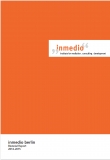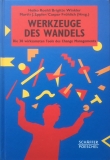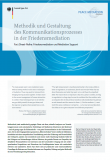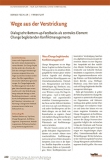Publikationen
Grundlagen der Mediation: Konzepte und Definitionen
Auswärtiges Amt und die Initiative Mediation Support Deutschland: Fact Sheet-Reihe: Friedensmediation und Mediation Support, 2016
Biennial Report 2014-2015
Biennial Report 2014-2015
From shared narratives to joint responsibility
Basic Guide to Mediation
Systemische Denkweisen in der Friedensmediation oder: Wie fängt man ein Huhn?
Wilfried Kerntke, Die Feedbackschleife der Organisationsmediation.
Wilfried Kerntke: Die Feedbackschleife der Organisationsmediation. In: Röhl et. al. (Hrsg), Werkzeuge des Wandels. Die 30 wirksamsten Tools des Change Managements, 2012
Fact Sheet: Methodik und Gestaltung des Kommunikationsprozesses in der Friedensmediation
Methodisch (statt anekdotisch) geprägte Zitate, aktuelle Analysen von Vermittlungsprozessen und systematische Debriefings mit Mediatoren illustrieren den Mehrwert – und oft genug sogar die Schlüsselrolle – von guter Kommunikation in der Friedensmediation. Die in den Eingangszitaten genannten „Mikrotechniken“ (micro skills) der Mediation, kombiniert mit einer empathischen Grundhaltung sowie der Erfahrung und Persönlichkeit der Drittpartei, spielen eine wesentliche und immer mehr Beachtung findende Rolle für das Gelingen von Verhandlungen. Aktives Zuhören, der gezielte Einsatz von Empathie, das detaillierte Herausarbeiten von Interessen und der konstruktive Umgang mit sich widersprechenden Perspektiven und Narrativen der Konfliktparteien lassen sich methodisch erlernen und optimieren. Dieses Fact Sheet soll auf praktischer und wissenschaftlicher Grundlage die Relevanz und Ausdrucksformen von Empathie, Haltung und guter Methodik für den Vermittlungserfolg beleuchten
Russian-Western Blind Spots: From Dialogue on Contested Narratives to Improved Understanding (Russian Version)
Russian Results of the Dialogue Group's work in the German-Russian Project 'Russia and ‘the West’: Towards a better understanding of what went wrong since the end of the cold war: Joint Analysis of Conflict Narratives and Exploration of Metanarratives' which was funded by the Federal Foreign Office and implemented in 2018.
Wege aus der Verstrickung
Dialogische Bottom Up-Feedbacks als zentrales Element Change begleitenden Konfliktmanagements. In: Konfliktdynamik 3/2014, S. 220 – 229






